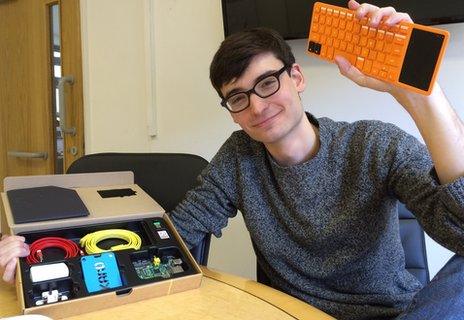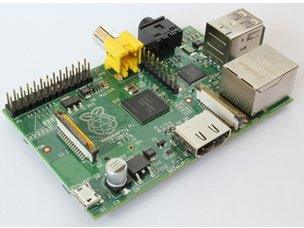Making a friendlier Raspberry Pi
- Published
- comments

In an office deep in London's trendy Shoreditch, Alex Klein is engaged on a mission. He's assembled a small team - an Israeli, an Italian and a smattering of recent Cambridge maths graduates - to address an important task. They are trying to make the Raspberry Pi more user-friendly.
Mr Klein, a former journalist, had his epiphany while he was trying to set up the cheap educational computer for his seven-year-old cousin. "It was totally impenetrable," he says. "The Raspberry Pi for Dummies guide was 400 pages long. It's an incredible piece of tech, but it's something that needs to be unleashed for normal people."
Having tried and failed myself to get a young person interested in Raspberry Pi, I understood what he meant. The computer designed to be put in the hands of every child in Britain to teach them programming has been a huge hit - but mainly with middle-aged men nostalgic about their teenage years playing with a BBC Micro or a ZX Spectrum. Nothing wrong with that, but even the people behind the Pi accept that they need to do more to make it accessible for children - and for parents and teachers.

So Klein and his colleagues have spent a year building Kano, a kit which he believes makes Raspberry Pi friendly rather than intimidating. "We think that everyone in the world, no matter how old you are or where you live, should be able to build a computer. It's powered by Raspberry Pi but has the simplicity of a Lego set. You make a computer, you learn code, you have fun."
The bare-bones piece of board now comes with a case, a colourful keyboard, cables - and most importantly an operating system designed by the Kano team to get users coding quickly. There's a simple manual - just a few pages rather than that huge For Dummies guide. Raspberry Pi was designed to be more difficult than the turn-it-on and play tablets and smartphones that are in the hands of today's children - but the Kano team aims to get users through the first intimidating barrier so that they can go on and do interesting and creative things with computers.
Kano is not a charity, but a business with big ambitions. Klein is lucky enough to have a relative who is one of the biggest names in London's venture capital community. Saul Klein of Index Ventures - father of that seven year old who wanted to build a computer - has helped fund this venture so far.
But now its wider appeal is going to be tested. Klein has turned to the crowdfunding site Kickstarter to try to raise $100,000 (£62,000) to finance the first production run of the Kano kit. "Kickstarter is a huge revolution in finance, just as the Raspberry Pi is in computing," he told me. "It gives you the ability to answer to nobody but the people who enjoy your product."
Now we will find out how big that crowd is.
In Britain, and around the world, the idea that we need to teach children to code has taken root. Organisations like Codecademy, Code Club and CoderDojo have sprung up to take this message into thousands of schools. They provide a software solution - but children respond to something more physical, more tactile.
"But what can you do with it?" will often be the first question when you show them a new computer or a programming language. Kano plans to build further kits which would allow Raspberry Pi users to code and build all kinds of things. The team showed me one example, Steve the Robot, built by Matthew Keegan, a recent graduate from Aberystwyth University. (Here's a video I shot of the robot, external.)
Kano isn't the first to try to build a business from Raspberry Pi. Sheffield-based Pimoroni started with a case for the Pi and now offers all kinds of kits. Other firms are offering all types of accessories, software and tutorials. It is heartening to see a British-built and designed computer make so many waves - but there is still a lot of work to be done before the mission to inspire a new wave of computing creativity among children is achieved.